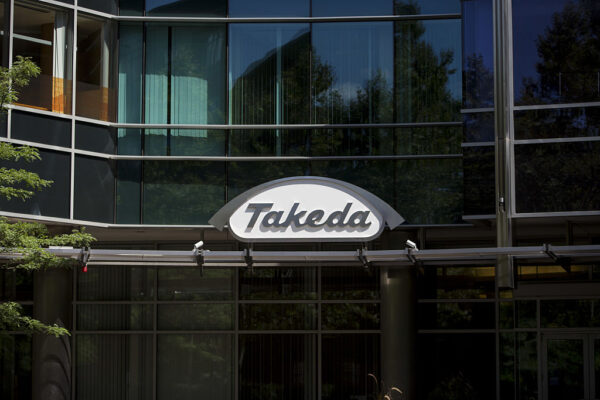
Takeda Pharmaceutical is stocking up its rare disease drug pipeline, reaching a deal for global rights to a Protagonist Therapeutics drug in late-stage development for the treatment of the rare blood disorder polycythemia vera.
Under deal terms announced Thursday, Takeda is paying $300 million up front to share in the development of the drug, rusfertide. Newark, California-based Protagonist remains responsible for completing the ongoing Phase 3 test and submitting the drug for FDA review. If it’s approved, the partners will share in U.S. commercialization of the drug while Takeda will commercialize the product in the rest of the world.
Polycythemia vera is an overproduction of blood cells. It’s caused by a mutation in the stem cells of the bone marrow, where red blood cells are produced. In addition to the higher red blood cell count, patients experience iron deficiency. The disorder raises the risk of cardiovascular events, such as heart attack and stroke. One common treatment for polycythemia vera is phlebotomy, frequent withdrawals of blood that decreases blood volume and reduces the levels of excess blood cells.
Rusfertide is a peptide from Protagonist’s peptide technology platform. The company said the drug’s exact mechanism of action is not known, but it’s thought to regulate iron homeostasis and control the absorption, storage, and distribution of iron in the body. In an open-label Phase 2 clinical trial enrolling 70 participants, Protagonist reported that the once-weekly injectable drug controlled red blood cell levels and eliminated the need for phlebotomies, achieving the main study goal. Longer-term data presented in December during the annual meeting of the American Society of Hematology showed the drug continued to show durable effects through two-and-a-half years.
A 250-patient, placebo-controlled Phase 3 study is underway with the same main goal as the mid-stage test. Protagonist expects to complete enrollment in the current quarter. In this 32-week study, rusfertide or a placebo will be added to a patient’s current polycythemia vera treatment regimen. In an investor presentation, Protagonist said it expects to have 32-week data in the first quarter of next year, potentially setting the stage for an FDA submission in the fourth quarter of 2025.
If rusfertide reaches the market, the deal calls for Takeda and Protagonist to split U.S. profits equally. Protagonist has an option to share in the marketing of the drug in the U.S. The biotech also has the right to opt-out of the profit share provision of the deal. Doing so would put Protagonist in line for opt-out payments and enhanced milestone and royalty payments. If Protagonist exercises either option, Takeda will still retain full rights to rusfertide outside of the U.S. According to a Protagonist regulatory filing, exercising the full opt-out right would put the company in line for up to $975 million in payments.
For Takeda, rusfertide fits the pharma giant’s strategy of acquiring late-stage assets in rare diseases, Julie Kim, president, U.S. business unit and U.S. country head, Takeda, said in a prepared statement. It also complements other assets in the pharma giant’s hematology portfolio. This past November, the FDA approved Takeda’s Adzynma, a treatment for congenital thrombotic thrombocytopenic purpura, a rare inherited enzyme deficiency that leads to blood clotting problems.
Protagonist does not yet have any FDA-approved products. President and CEO Dinesh Patel said the Takeda deal allows his company to focus on completing rusfertide’s Phase 3 study while leveraging Takeda’s global commercialization capabilities to immediately start pre-commercial work.
“As we progress towards a fully integrated pharmaceutical company, this deal mitigates the inherent execution risks of a first-time commercial launch, optimizes the timing and enhances the scope for peak potential sales of rusfertide, while still allowing us to actively participate in the commercial experience and economics with a 50:50 profit split in the U.S. market,” Patel said.
PharmaEssentia claimed the first FDA approval of a polycythemia vera therapy in 2021. This injectable drug, named Besremi, is an engineered version of interferon alpha. It’s believed to activate a signaling cascade that reduces production of red blood cells. The approved indications of Incyte small molecule drug Jakafi include polycythemia vera. Others developing potential treatments for the disease include Silence Therapeutics with a drug that employs RNA interference, and Ionis Pharmaceuticals, whose drug candidate is an antisense oligonucleotide.
Photo: Scott Eisen/Bloomberg, via Getty Images










